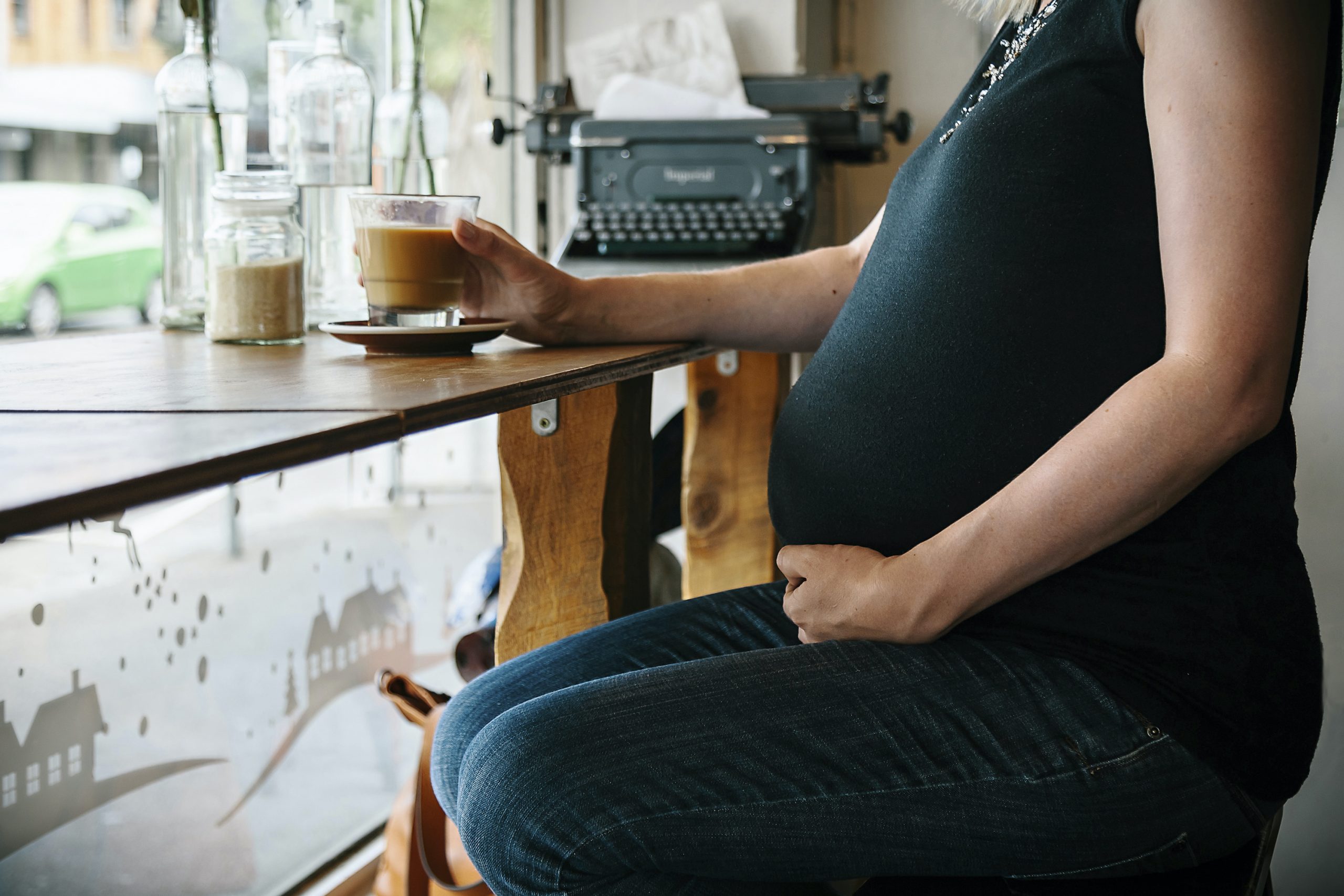Can you drink coffee while pregnant?


Parenting advice, hot topics, best buys and family finance tips delivered straight to your inbox.
You are now subscribed
Your newsletter sign-up was successful
You might have enjoyed a morning cup or two before, but can you drink coffee while pregnant? We've asked the experts for best practice around coffee-drinking during those precious 9 months.
Pregnancy is a joyous and heart-warming experience for women, as you look forward to meeting your little bundle of joy. Yet it does sometimes come with a side of anxiety, with mums-to-be often overloaded with information on what to eat when pregnant and foods to avoid when pregnant for the sake of the baby's health.
"One of the foods women are advised to be wary of is caffeine," explains former midwife Rachel Fitz-Desorgher, citing the famous substance in coffee. "From how much is too much to whether cutting down on caffeine just means cutting down on coffee and other foods that contain that get-up-and-go juice. If you’re wondering how to keep yourself and your baby safe for the full 9 months then get acquainted with the rules around it."
Can you drink coffee while pregnant?
In a nutshell, yes you can drink coffee while pregnant. However whilst you don't necessarily have to give up coffee, it's important to be aware of the limitations.
The concern around coffee during pregnancy is based on the drink's high caffeine content. And medical experts ask mums-to-be to not drink more than the recommended daily limit on caffeine when expecting just to be safe.
"You can safely have up to 200mg of caffeine a day," says midwife Rachel FitzD. "So whilst it isn’t sensible to chug down your own body weight in cappuccinos every day, you can enjoy that morning kick of caffeine."
The NHS England website also states that pregnant women should drink no more than 200mg of caffeine per day. And this guidance is further agreed by Dr Deborah Lee."Caffeine is regarded as a psychoactive drug. It’s often used to help those who feel tired and fatigued in order to keep them awake, as it stops you from feeling drowsy," she tells us. "Many women regularly drink a lot of coffee, but when they become pregnant, they need to control their caffeine intake, for the sake of their unborn baby."
Parenting advice, hot topics, best buys and family finance tips delivered straight to your inbox.
Is one coffee a day OK while pregnant?
Our experts agree that one coffee a day is OK while pregnant.
This is because one cup of coffee - be it instant or filter coffee - will not surpass the 200mg a day caffeine limit during pregnancy:
- One cup of instant coffee contains 100 mg caffeine.
- One mug of filter coffee contains around 140 mg of caffeine.
So far, so good. But there's other factors expectant mums should consider when it comes to this caffeine limit.
"Remember when you calculate your daily caffeine intake this is caffeine from all sources including food (such as chocolate), medication (such as Anadin), and any energy drinks," says Dr Deborah.
Those who prefer a morning brew over a cup of coffee should also make note of its caffeine content. With one mug of tea containing 75 mg of caffeine. The bottom line is that if you stick to the 200mg a day limit in pregnancy then you should generally be fine. "There is no conclusive evidence that a low caffeine intake is harmful to a pregnancy, so long as the safe level is not superseded," Dr Deborah adds.
The Royal College of Midwives (RCM) support this logic. Their review into the current caffeine limit guidance shows that it "does not appear to be linked to poor pregnancy outcomes."
Can you drink decaf coffee while pregnant?
"You can drink decaf coffee and tea no problem while pregnant," says expert midwife Marley Hall.
Decaf tea and coffee goes through a process where the original caffeine content is stripped away. Yet it's worth noting that decaf products can never guarantee being completely caffeine free.
The US Food and Drugs Administration have clarified that in order for coffee to be sold as 'decaffeinated' it has to have at least 97% of the original caffeine removed.
Brand Roasty Coffee have outlined the typical caffeine values found in decaf coffee varieties:
- (237ml) Decaffeinated brewed coffee = 2-12mg of caffeine
- (30ml) Decaffeinated espresso coffee = 0-15mg of caffeine
- (237ml) Decaffeinated instant coffee = 27-173mg of caffeine
If decaf coffee is a new thing for you in pregnancy, then Dr Deborah has a tip for slowly switching to this low-caffeine alternative.
"You could try to reduce your caffeine intake gradually, perhaps by mixing half and half caffeinated and decaffeinated to start with and then gradually eliminating the caffeinated variety altogether."
How does caffeine affect a fetus?
The reason why doctors prescribe a limit on caffeine during pregnancy is because high amounts of the substance have been linked to certain fetus health issues.
"Caffeine affects the baby by increasing the baby’s heart rate, similar to how it would do for an adult so it can make them quite hyper," midwife Marley tells us.
One 2021 study found that caffeine comes into contact with your fetus via the placenta after its travelled through the bloodstream. Researchers found that large quantities can subsequently impact child development in the womb and your chances of miscarriage. Whilst this may sound scary, midwife Marley assures us that this is the risk when consumption is excessive.
“There is some evidence that caffeine increases the risk of miscarriage. This would be a high risk for women who drink multiple cups of coffee or energy drinks throughout the day. In particular people who drink around 5-6 cups plus," she says. "Keeping within the 1-2 cups guidelines should keep the risk of complications extremely low.”
The Royal College of Obstretricians and Gynaecologists (RCOG) and the Miscarriage Association have also listed caffeine reduction in pregnancy to reduce the risk of miscarriage. They stress that this is lower on the list in comparison to factors like smoking, diet and weight.
Other caffeinated food and drinks to look out for:
Several other products in the pantry carry a hefty caffeine content. It's important to factor this in when calculating the 200mg daily caffeine limit during pregnancy.
- Chocolate - In many ways, dark chocolate is good for you. But, a 50g bar of dark chocolate has up to 25mg of caffeine. "It's good to know that milk chocolate has less than half the amount of caffeine as dark chocolate gram for gram," says midwife Rachel. "So, if you’re fancying a nice cappuccino and a chocolate treat, maybe choose the milk over the dark chocolate bar."
- Energy drinks - Whilst brands varies, energy drinks typically contain 80 mg per can. "Other caffeinated foods and drinks to look out for are things like Red Bull and energy drinks that should be avoided during pregnancy or consumed in limited quantities," says midwife Marley.
- Green tea – "Green tea is especially high in caffeine, containing 3 mg caffeine per 29 ml," advises Dr Deborah. "In an average 240 ml mug of tea, this could add up to over 24 mg in one drink."
- Colas and sodas – "A can of cola has 40mg of caffeine," says midwife Rachel. "So don’t keep topping up on cola when you’re trying to cut back on coffee." Diet Coke contains 23 mg caffeine in a standard sized can. And beware of sodas – cream soda contains 25 mg per can.
- Energy bars – They might be one of the best foods to boost energy levels but these can contain 65 mg of caffeine per bar.
- Pain killers - "Some pain killers contain caffeine," stresses Dr Deborah. "For example, each tablet of Anadin extra contains 45 mg of caffeine." You should talk to your doctor if you worry about prescription pills and caffeine during pregnancy.
If you're worried, Dr Deborah advises, "Always read the food labels. By law in the UK caffeine must be listed as an ingredient, after the word 'flavourings'."

Rachel Fitz-Desorgher is a leading, internationally-known baby expert, and parenting mentor. Having worked for over 30 years as a midwife, infant feeding specialist, active birth teacher and parenting consultant, she published her first book, Your Baby Skin To Skin in 2017 and it quickly gathered five-star status with its reviewers. Rachel Fitz-Desorgher has has been featured in several articles for publications including The Daily Mail, The Independent, The Express and Yahoo Lifestyle. She's also a regular contributor for Mother&Baby. When not writing, Rachel runs workshops and presentations on how evolution impacts on baby and parent behaviour, and mentors executive women transitioning from the corporate life to motherhood.

Emily Stedman is the former Features Editor for GoodTo covering all things TV, entertainment, royal, lifestyle, health and wellbeing. Boasting an encyclopaedic knowledge on all things TV, celebrity and royals, career highlights include working at HELLO! Magazine and as a royal researcher to Diana biographer Andrew Morton on his book Meghan: A Hollywood Princess. In her spare time, Emily can be found eating her way around London, swimming at her local Lido or curled up on the sofa binging the next best Netflix show.